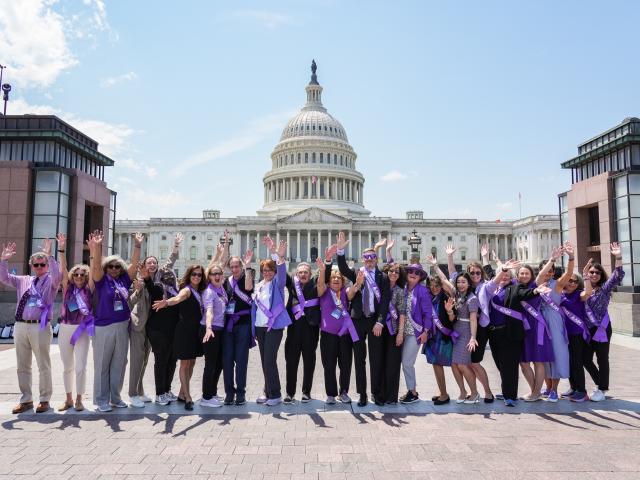Alzheimer’s Association Applauds Biden Administration for Introducing GUIDE Model, Consistent with the Comprehensive Care for Alzheimer’s Act
WASHINGTON, D.C., July 31, 2023 — Today, the Alzheimer’s Association enthusiastically welcomed the Biden Administration’s announcement of a new Centers for Medicare & Medicaid Services (CMS) initiative to improve the way dementia care is delivered for people living with Alzheimer’s disease and other dementia. This test initiative, the Guiding an Improved Dementia Experience (GUIDE) Model, will be run through the Center for Medicare & Medicaid Innovation (CMMI). The announcement comes after Alzheimer’s advocates and bipartisan congressional champions have been growing support in Congress for the Comprehensive Care for Alzheimer’s Act (H.R. 1637 / S. 626). This CMS initiative is consistent with the bipartisan bill to provide access to dementia care management, which is an important tool to improve the quality of care, ease the challenges of Alzheimer’s caregiving and reduce costs.
“On behalf of the Alzheimer’s community, thank you to the Biden Administration for working to streamline today’s complicated health care maze for people living with dementia and their caregivers,” said Joanne Pike, DrPH, Alzheimer’s Association president and CEO. “We have advocated for this approach for years, believing it the key to addressing systemic challenges faced by those with dementia, their families and those who provide them with care and support. Now CMS, working with bipartisan congressional champions, is taking this model a major step forward. We are tremendously grateful for their leadership, and we look forward to continuing our work with both Congress and CMS to continue advancing innovative policy solutions to provide high-quality dementia care for all those impacted by Alzheimer’s and other dementia.”
Today’s action by CMS on this initiative wouldn’t have been possible without the hard work of the Comprehensive Care for Alzheimer’s Act lead sponsors Senators Debbie Stabenow (D-Mich.) and Shelley Moore Capito (R-W. Va.) in the Senate and Reps. Darin LaHood (R-Ill.), Brian Higgins (D-N.Y.), Tom Cole (R-Okla.) and Paul Tonko (D-N.Y.) in the House. Sens. Stabenow and Capito recently led a bipartisan letter to CMMI, urging swift implementation of a dementia care management model using existing authority.
Caring for an individual living with dementia involves many unique and often challenging elements. Dementia care management is a model of care that enables individuals living with Alzheimer's and their caregivers to more seamlessly navigate the health care and social support systems and obtain more timely access to care. In their announcement today, CMS said its GUIDE Model will test an alternative payment for participants who deliver key supportive services to people with dementia, including comprehensive, person-centered assessments and care plans, care coordination, and 24/7 access to a support line. People living with dementia and their caregivers will also have access to a care navigator who will help them access services and supports.
In addition, the model will help people with dementia and their caregivers access education and support by providing a link between the clinical health care system and community-based providers. Model participants will help caregivers access respite services, which enable them to take temporary breaks from their caregiving responsibilities.
The initiative also aims to improve the health outcomes and caregiving experience of underrepresented individuals and their families through increased access to specialty dementia care. The GUIDE Model will provide financial and technical assistance for developing new dementia care programs targeted to underserved areas.
"Not only is dementia care management a proven way to improve the quality of care and quality of life for those living with Alzheimer’s and other dementia, but now we know that it would also save the federal government billions of dollars," said Robert Egge, Alzheimer's Association chief public policy officer and Alzheimer's Impact Movement (AIM) executive director. “This initiative from CMS also comes at an extremely important time as new disease modifying treatments for Alzheimer’s introduce new challenges and opportunities for care providers. While these treatments are only for individuals living with early Alzheimer’s, this care model aims to benefit all those with dementia at any stage.”
A recent budgetary analysis shows that providing care as proposed in the Comprehensive Care for Alzheimer’s Act would save CMS money. The analysis, commissioned by the Alzheimer’s Impact Movement (AIM) and conducted by health care consulting firm Healthsperien, found that better care through dementia care management would save the federal government nearly $21 billion over 10 years — while also improving the quality of life for individuals living with dementia and their families.
However, these programs will not develop on their own because health care practitioners would need to provide unreimbursed services without capturing these offsetting savings. To encourage and facilitate the development of dementia care management programs under Medicare, a change in the payment structure is necessary.
Alzheimer’s Association and AIM grassroots advocates and staff have held thousands of congressional meetings to secure support for the Comprehensive Care for Alzheimer’s Act since the bill’s introduction in the last congress, and have worked tirelessly to secure support for the benefit at CMS. As of today there are 28 bipartisan cosponsors in the Senate and 29 in the House. The Alzheimer's Association will continue to engage CMS to ensure the service’s maximum impact for people living with the disease and their caregivers.
